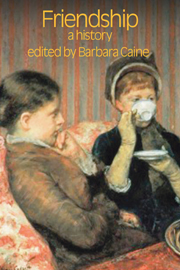Book contents
- Frontmatter
- Contents
- Preface
- Introduction
- 1 The Classical Ideals of Friendship
- 2 Cicero on Friendship
- 3 The Latin West
- 4 Renaissance Friendships: Traditional Truths, New and Dissenting Voices
- 5 From Christian Friendship to Secular Sentimentality: Enlightenment Re-evaluations
- 6 Taking up the Pen: Women and the Writing of Friendship
- 7 Class, Sex and Friendship: The Long Nineteenth Century
- 8 New Worlds of Friendship: The Early Twentieth Century
- 9 The Importance of Friends: The Most Recent Past
- Bibliography
- Index
Introduction
- Frontmatter
- Contents
- Preface
- Introduction
- 1 The Classical Ideals of Friendship
- 2 Cicero on Friendship
- 3 The Latin West
- 4 Renaissance Friendships: Traditional Truths, New and Dissenting Voices
- 5 From Christian Friendship to Secular Sentimentality: Enlightenment Re-evaluations
- 6 Taking up the Pen: Women and the Writing of Friendship
- 7 Class, Sex and Friendship: The Long Nineteenth Century
- 8 New Worlds of Friendship: The Early Twentieth Century
- 9 The Importance of Friends: The Most Recent Past
- Bibliography
- Index
Summary
No one can underestimate the importance attributed to friendship in contemporary society. It is seen as an indication of social integration and a requirement of both physical and mental health as well as a source of happiness. It is a relationship subject to constant representation, discussion and analysis in newspapers and magazines and in contemporary film and television programs, as the popular series simply called Friends attests. As is so often the case, the current popular interest in friendship has an academic counterpart in the immense amount of research which has been done recently into the meaning and nature of friendship in different societies, and in earlier stages of our own. Scholars working in many different disciplines including sociology, psychology and anthropology as well as literature, history and philosophy have all turned their attention to questions about friendship. Most of this research has sought to explore the many different ways in which friendship was described, understood, organized and experienced in different societies and cultures, and to analyse its meaning, role and importance in a range of different contemporary societies and cultures and in the past.
Friendship: A History seeks to build on and to extend this research by looking at the history of friendship in the West over the past 2500 years – from the days of Classical Athens to the present day. This lengthy period enables us to show the long-standing importance accorded to friendship as a relationship fundamental both to social and individual wellbeing.
- Type
- Chapter
- Information
- FriendshipA History, pp. ix - xviPublisher: Acumen PublishingPrint publication year: 2009



